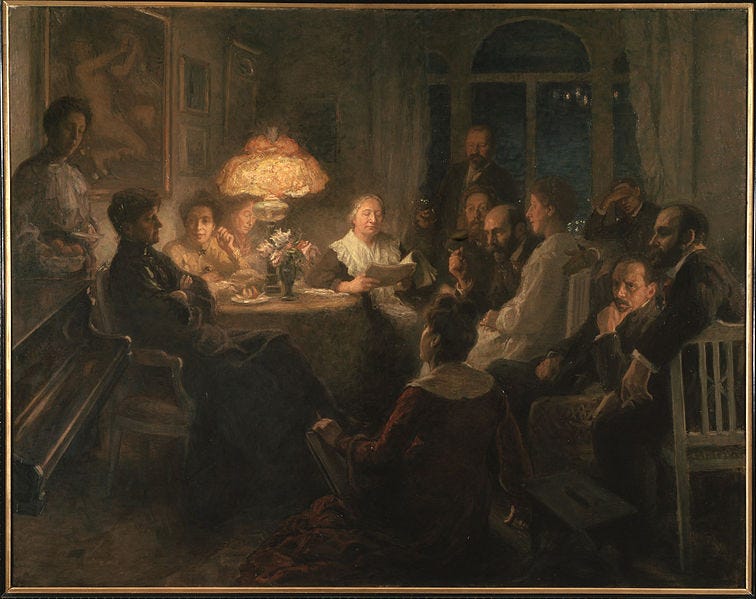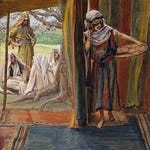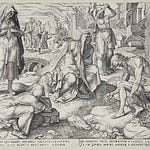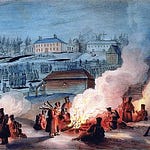The ancients thought and wrote a lot about the heart of what it means to be someone named by our Word of the Week, a friend. Cicero wrote a charming treatise on friendship, in which he says, among many other things, that a friend is someone in whose presence you can think out loud. Cicero had a lot of enemies, as any political player is going to have, especially if he’s honest, but he did have some very dear friends, in Brutus, who would one day be the principal assassin of his onetime friend Julius Caesar, and in Atticus, a mild and wise man of letters, and an Epicurean in his philosophy, which Cicero was not. In fact, Cicero won’t put up with any nonsense to suggest that we’re friends with people because we get pleasure or other good things from them. That’s what the Epicureans said, and Cicero thought that it put “friendship” out to use.
But it’s the other way around, said Cicero. Because we are friends, and true friendship can only be founded in virtue, we delight in one another’s company, and friends don’t abandon one another when that delight is overshadowed by danger, or sadness, or misfortune, or even the threat of death. In that world, it meant a lot to call someone your friend. That’s why Jesus, who had befriended his apostles for three years, says at the Last Supper that he no longer calls them his servants, but his friends: not because of any greater love that he feels, but because he has chosen to be entirely open with them. “All that the Father has made known to me,” he says, “I make known to you.”
Sometimes, when you delve into the etymology of a word, it happens to reveal somewhat of the essence of the thing, and that’s the case here with friend. Its ancient source is an Indo-European root, pri- or preyh-, meaning to esteem, to love. But there seemed to be an additional association that attached itself to the word as it showed up in a few of the principle limbs of the Indo-European language tree. If you love someone, you do not make a bondslave of him; he is free; hence we get Welsh rhyddid, freedom, as they sing in that great fight song “Men of Harlech,” and we get Germanic freo, free. Now, if you’re really free in the company of someone, it means that you needn’t worry that your next word will cause him to leap upon the table and put a knife to your neck. So from the Germanic adjective we get the noun frithu, meaning peace. That shows up as modern German Frieden, and also in all the Fred- names you can think of. Frederick, as in Fred Flintstone, means Peace-Rule, which Fred the irascible wasn’t usually known for; and Winfred means Peace-Fellow, that is, somebody who stands shoulder to shoulder in the victory of Peace
.Aristotle, who was Plato’s most brilliant pupil, later diverged from his master’s teachings, though not so much, I think, as some have supposed. He said that he was a friend to Plato, but a greater friend to Truth. That saying would have pleased Plato, too. For the highest aim of the human soul, as Plato saw it, was union in friendship with the divine, a union that you couldn’t fully enjoy unless it was in the company of others, and that’s why, I think, Plato wrote in dialogues all the time. It wasn’t just to present the back-and-forth of argument, by the so-called “Socratic method.” It was to draw people into friendship, often by showing what it looks like for friends to pursue the truth.
There’s something else about our word that I’d like to mention: the -nd at the end of it. Where did that come from? Well, it is the suffix to show the present participle of the verb. German still has it; Latin had it as -nd and -nt, and so do Latin’s daughters in the various Romance languages. In English it’s been replaced by -ing. Anyway, what Old English freond meant was someone who is doing the free-making, the esteeming, the cherishing. It’s got a strong verbal force. Its opposite in Old English was another present participle: the feond, somebody who hates your guts. I’ll bet you can guess what that word became in modern English!
Word & Song by Anthony Esolen is a reader-supported online magazine devoted to reclaiming the good, the beautiful, and the true. We publish six essays each week, on words, classic hymn, poems, films, and popular songs, as well a weekly podcast, alternately Poetry Aloud or Anthony Esolen Speaks. To support this project, please join us as a free or paid subscriber.














